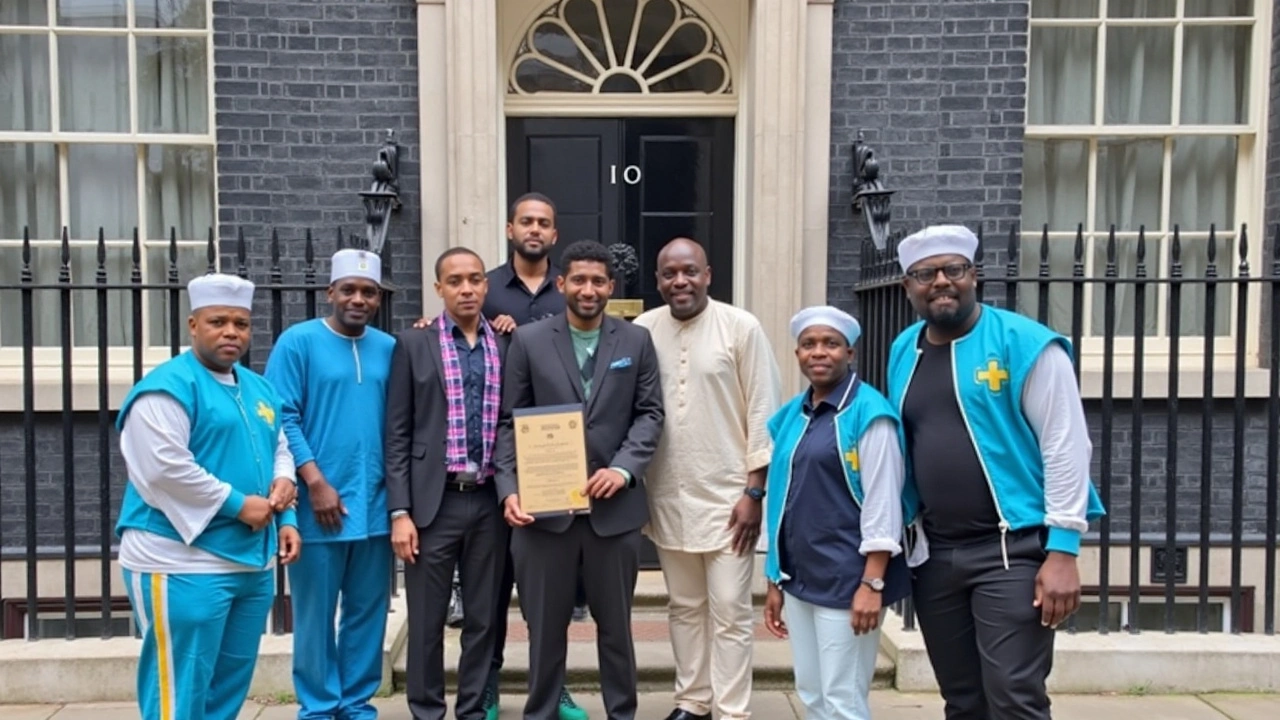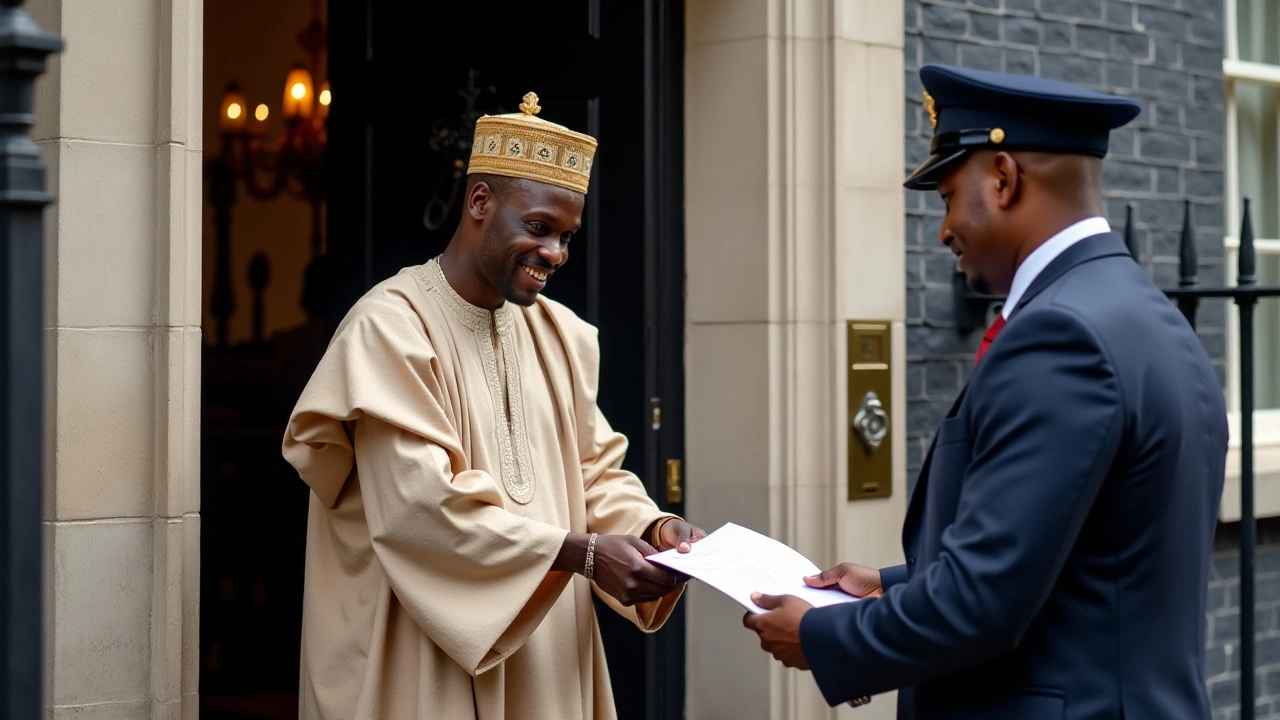Yoruba Nation Movement Takes Step Towards Independence
In a bold and decisive action, Sunday Adeyemo, universally recognized as Sunday Igboho, has brought the aspirations of the Yoruba nation to the forefront by reaching out to the UK government. This audacious step involved submitting a pivotal petition directly to the UK Prime Minister, Keir Starmer. This move represents the aspirations of countless Yoruba people who yearn for a sovereignty that encapsulates their cultural identity and self-determination. With the prestigious setting of 10 Downing Street as the backdrop, Igboho, alongside esteemed dignitaries, marched forward to echo the sentiments that have long echoed in the hearts of the Yoruba populace. The mission to carve out an autonomous state for the Yoruba nation from the South-West region of Nigeria has gained remarkable momentum in recent times, with growing support among diaspora groups and local sympathizers alike.
The journey to this crucial milestone has been arduous, marked by trials and unwavering passion. For the Yoruba nation, this petition signifies more than just a call for territorial independence; it embodies a plea for recognition and respect. Professor Banji Akintoye, the sagacious leader of the Yoruba Nation Movement, has been the guiding force behind this endeavor, offering his wisdom and leadership to propel the cause forward. The bid for independence is laden with historical significance, evoking memories of past struggles and triumphs of the Yoruba ethnic group. The diplomatic engagement with the UK indicates a strategic initiative to garner international support, which is seen as essential for the movement’s success.
The Strategic Alliances and Partnerships
Accompanying Sunday Igboho in this diplomatic mission were influential figures from the Yoruba Nation Movement, each carrying their own share of responsibility and influence. Among them was Prophet Ologunoluwa, the Diaspora Youth Leader, whose role has been instrumental in rallying the youth behind the movement's cause. With young voices amplifying the call for autonomy, the movement's reach has expanded beyond boundaries and generations. Fatai Ogunribido, the Vice President of Ifeladun Apapo, was also present, offering his strategic insights and support. Alhaja Adeyeye, the General Secretary of Yoruba World Media, has ensured that the movement’s messages echo loudly through mass communication channels, fostering a narrative that resonates on a global scale. Additionally, Paul Odebiyi, representing the grassroots supporters, added his voice to the collective call for change. Through their collaboration, these key figures underscore the unity and resolve of the Yoruba Nation Movement.
Implications and Future Prospects
The submission of this petition poses significant implications both within Nigeria and on the international stage. It has stirred discussions regarding the legitimacy and feasibility of breaking away from Nigeria to form an independent Yoruba state. Critics question the practicality of such an endeavor, pointing to the complexities of geopolitical dynamics and national integration. Yet, supporters are unwavering, enthused by the prospect of cultural renaissance and self-determination. The move has sparked dialogues among policy analysts and political scholars, who analyze the historical precedents of secession and the potential impact on regional stability. Furthermore, it serves as a case study for other ethnic groups pursuing similar objectives globally, potentially influencing movements that seek autonomy and recognition.
The Yoruba Nation Movement hopes that this direct appeal to the UK government will garner critical support and visibility. The petition serves as a clarion call to international stakeholders, urging them to engage with the narrative of Yoruba self-governance. As the next steps unfold, eyes are fixated on the UK Prime Minister's response, which could signal a pivotal juncture for the movement. The awareness and credibility that follow this submission might catalyze further diplomatic efforts, fortifying the movement's aspirations for an independent Yoruba nation.

A March Towards Self-Determination
This moment in history will be remembered as a significant stride for the Yoruba people in their quest for identity and autonomy. The spirited efforts of Sunday Igboho and his compatriots highlight the evolving dialogue on self-determination and minority rights. In an era where globalization often clouds cultural identities, the Yoruba Nation Movement symbolizes a resurgence of traditional values and community-oriented tenacity. As they await the response from Downing Street, the advocates remain hopeful and determined, bearing the weight of cultural heritage and the dreams of generations past. The path to independence is riddled with challenges, but for many Yoruba, the dream of self-governance is a journey worth embarking upon.

Barry Hall
October 14, 2024 AT 05:09Interesting move from Igboho; let's see how the UK reacts 😊.
abi rama
October 20, 2024 AT 00:02The Yoruba Nation’s push for self‑determination is a bold statement of cultural pride. While the road ahead is complex, the diaspora’s involvement could shape a constructive dialogue.
Megan Riley
October 25, 2024 AT 18:55Absolutely, the momentum builds, especially when leaders like Igboho step onto the world stage, rallying supporters across continents, and reminding everyone that cultural heritage matters, even if the bureaucracy moves slower than we’d like. Stay hopeful, keep the convesation alive, and remember that every petition adds a brick to the foundation of change.
Lester Focke
October 31, 2024 AT 12:49The yearning for a sovereign Yoruba state invokes a profound historical narrative that stretches back to pre‑colonial assemblies. One must acknowledge that the Sokoto Caliphate and subsequent colonial demarcations imposed artificial boundaries that often ignored ethno‑linguistic realities. In contemporary international law, the principle of self‑determination, enshrined in the UN Charter, provides a theoretical basis for such aspirations. Nevertheless, the doctrine of territorial integrity remains a countervailing force that states invoke to preserve the status quo. The petition to Downing Street, therefore, represents not merely a diplomatic gesture but a strategic attempt to internationalize the discourse. British foreign policy, with its historical ties to Nigeria, may be predisposed either toward cautious engagement or outright dismissal. Moreover, the involvement of diaspora leadership, exemplified by Mr. Igboho, adds a transnational dimension that complicates the calculus of legitimacy. Academic observers have noted that diaspora activism can amplify marginal voices while simultaneously risking detachment from on‑ground realities. From a geopolitical perspective, the fragmentation of Nigeria could recalibrate power balances in West Africa, affecting regional security frameworks such as ECOWAS. Economic ramifications would also be considerable, given the Yoruba region's contributions to Nigeria's GDP through commerce, agriculture, and technology. Critics rightly caution that secession could precipitate violent conflict, as witnessed in other African contexts. Proponents, however, argue that a peaceful, negotiated pathway is feasible if mediated by impartial international actors. In this vein, the petition could serve as a catalyst for initiating such mediation, provided that the United Kingdom perceives a credible demand. It is incumbent upon scholars and policymakers alike to scrutinize the legal precedents set by precedent cases such as South Sudan's independence. Equally important is the need to respect the wishes of the indigenous Yoruba populace, whose cultural identity underpins the entire movement. Ultimately, the trajectory of this initiative will hinge upon a delicate balance between aspirations for self‑rule and the pragmatic constraints of statecraft.
Naveen Kumar Lokanatha
November 6, 2024 AT 07:42Indeed, the historical context you outline is compelling; the legal nuances deserve close study. The diaspora’s role is definitely significant.
Alastair Moreton
November 12, 2024 AT 02:35Honestly, I think this whole independence hype is overblown. They’re probably just looking for media attention, and the UK isn’t going to get involved in a Nigerian internal issue.
Surya Shrestha
November 17, 2024 AT 21:29While your skepticism is noted, it is essential to consider that secessionist movements across the globe have, on numerous occasions, secured international acknowledgment, particularly when backed by coherent diplomatic strategies, sustained grassroots mobilization, and demonstrable cultural cohesion; overlooking these precedents risks a shallow analysis of the Yoruba petition.
Rahul kumar
November 23, 2024 AT 16:22The legal pathway for a group seeking statehood typically involves a clear referendum, widespread internal support, and recognition by existing states; in Nigeria’s case, the constitution emphasizes unity, so any push for a separate Yoruba state would need constitutional amendments or a judicial ruling. It’s a tough road, but not impossible if the movement garners enough domestic and internationl backing.
mary oconnell
November 29, 2024 AT 11:15Oh, absolutely, because every diaspora petition automatically equals a UN‑mandated nation‑state, right? The geopolitical theater loves nothing more than a well‑crafted press release, especially when it’s drenched in cultural rhetoric and lofty aspirations.
Michael Laffitte
December 5, 2024 AT 06:09Wow! This is the kind of story that makes you want to jump up and shout, “Yoruba rise!” The passion is contagious, and I can feel the energy pulsing through every line of that petition.
sahil jain
December 11, 2024 AT 01:02The enthusiasm is understandable, yet the practicalities of international law and regional stability must be addressed before any celebratory chants.
Bruce Moncrieff
December 16, 2024 AT 19:55Imagine a future where the Yoruba people chart their own destiny, crafting a nation that reflects their rich heritage and modern aspirations. The journey will be riddled with challenges, but the resolve shown at Downing Street hints at a momentum that could reshape West African politics.
Dee Boyd
December 22, 2024 AT 14:49We should be cautious about glorifying secession without considering the human cost; history warns us that fragmented states can lead to prolonged suffering and loss of life.
Carol Wild
December 28, 2024 AT 09:42It’s a well‑known pattern, dear readers, that external powers covertly influence separatist movements to destabilize regions that threaten their economic interests, and the timing of this Yoruba petition-just as global powers wrestle for oil and trade dominance-cannot be dismissed as mere coincidence. One must ask who stands to gain from a fragmented Nigeria: the answer, inevitably, points toward multinational corporations and foreign governments seeking new markets and strategic footholds, a reality obscured by the glossy narrative of cultural self‑determination. Moreover, the involvement of a charismatic figure like Igboho, whose media presence rivals that of seasoned political strategists, raises eyebrows about the orchestration behind the scenes, where PR firms and lobbying groups may be crafting a story that serves hidden agendas. The United Kingdom’s historical ties to Nigeria add another layer of complexity; a subtle nod to British influence might be at play, subtly steering the petition toward outcomes favorable to London’s geopolitical calculations. While the surface discourse celebrates heritage, beneath lies a labyrinth of financial incentives, covert alliances, and political machinations that have been the hallmark of engineered secessions throughout modern history. In short, one should remain skeptical and scrutinize the broader geopolitical chessboard before embracing the petition as a purely indigenous endeavor.
Rahul Sharma
January 3, 2025 AT 04:35Precisely, the geopolitical undercurrents you describe demand rigorous analysis; ignoring the financial incentives and foreign policy motives would be a grave oversight, and scholars must dissect every facet of this movement.
Emily Kadanec
January 8, 2025 AT 23:29Interesting perspective.
william wijaya
January 14, 2025 AT 18:22The tapestry of identity, sovereignty, and regional stability is indeed intricate; your points illuminate how intertwined these factors become when a people envision nationhood.
Lemuel Belleza
January 20, 2025 AT 13:15Conversations like this often overlook the practicalities.
faye ambit
January 26, 2025 AT 08:09Perhaps the true measure lies not in political borders but in how cultures preserve their essence amidst change.